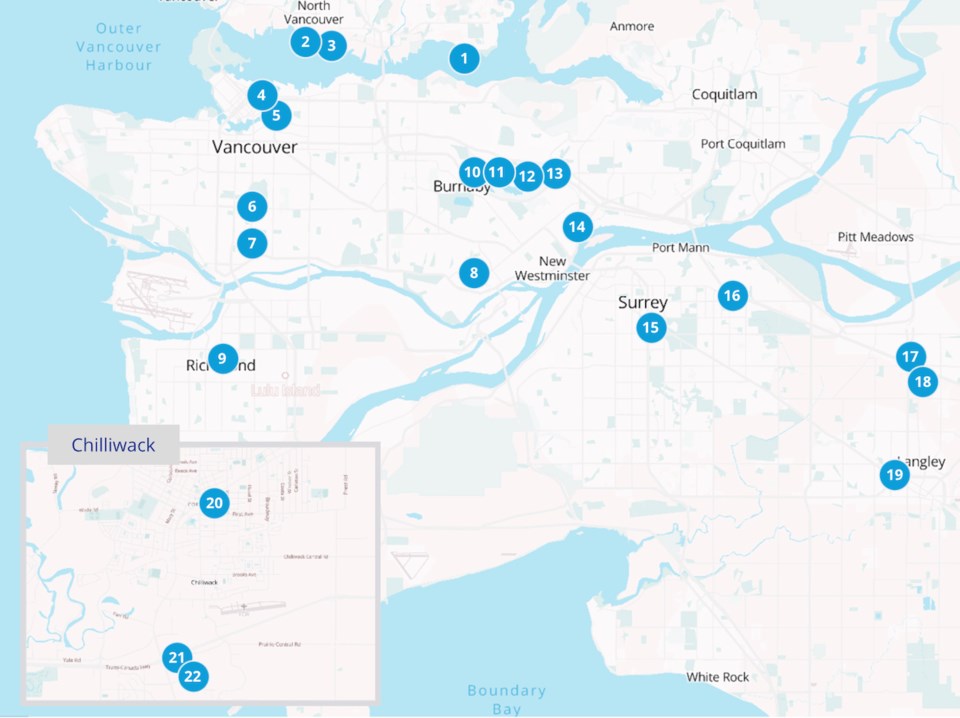A shortage of retail space in Metro Vancouver is focusing attention on the Broadway Corridor as tenants seek to position themselves for a stronger economy in the latter half of 2023.
“Tenants looking to locate in suburban areas are exceptionally challenged in finding options,” Colliers International noted in a report this week on the region’s retail sector. Suburban retail vacancies have dropped to just one per cent, down from 2.3 per cent six months ago. “As a result, the focus of demand is projects yet to be constructed, with the recently approved Broadway Plan a key target.”
The Broadway Plan, approved last summer, allows for lot consolidation and larger floorplates. This creates opportunity for more creative retail space options beyond the standard 1,200 to 1,500-square-foot retail units in most mixed-use projects.
“If you’re looking for a large block of space downtown, like 25,000 square feet-plus, it really doesn’t exist or it’s very difficult to find,” said Sherman Scott, an associate vice-president with Colliers International in Vancouver focused on the retail market. “With the new developments being planned, we anticipate there will be some opportunities for these larger-format retailers to be accommodated.”
The departure of home décor store Pier 1 from the 1700-block of West Broadway has been filled by La Win Supermarket, a Chinese grocer, and similar opportunities are likely to arise in new construction.
“There’s some users or tenants that would like to be in our market that aren’t able at this point,” Scott said. “With lot consolidation, there could be some opportunities for these larger-format retailers.”
Any new space would alleviate the pressure on the region as a whole, he said. While vacancies in suburban markets are “super-low,” Scott said downtown Vancouver is no picnic either at just four per cent. A balanced market that provides tenants with a reasonable number of space options is closer to eight per cent.
“We’re challenged for space, so any new space that can be added to the market will, I think, be helpful,” he said. “It’s going to take a while for the Broadway Plan to play out. … There certainly will be demand from retail tenants as a result of that, absolutely. But it’s early stages right now.”
The limited opportunities for new entrants are contributing to a relatively strong retail leasing market despite the economic headwinds facing consumers and upper-end retailers.
Some downtown retailers are struggling to repay rent deferrals as reopening has played out because the return to the office hasn’t been a full return, with just two-thirds of workers back full-time. High inflation and recessionary influences through the latter half of 2022 further limited discretionary spending. While demand from retailers that thrive on in-person interactions and discount retailers has been strong, vacancies ticked up on Robson and Alberni between Thurlow and Bute.
“We’re still seeing some casualties from COVID,” Scott said. “The return to office, it’s been good but there’s still a ways to go. … The footfall isn’t quite where it was pre-COVID. It’s a lot better but it’s still not there.”
“There’s a recalibration happening in Vancouver retail,” said Colliers senior managing director Madeleine Nicholls, who sees long-term strength in the market. “While we could see some bumpiness in the next few quarters, fundamentals remain strong and the long-term outlook for Vancouver retail remains positive.”
Scott shares the optimism, but he’s cautious about prospects of a recovery later this year.
“[Vacancy] not being super-low, I anticipate that space will get leased up,” he said of vacancies left by post-COVID casualties. “But let’s see how this year [goes]. … I haven’t seen a market like this. It’s so difficult to predict right now.”



